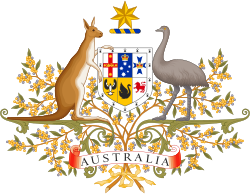Wotjobaluk, Jaadwa, Jadawadjali, Wergaia and Jupagulk Peoples v Victoria facts for kids
The case of Wotjobaluk, Jaadwa, Jadawadjali, Wergaia and Jupagulk Peoples v Victoria was an important decision made by the Federal Court of Australia on December 13, 2005. Justice Ron Merkel made this ruling about a native title claim in the Wimmera region of Victoria. This decision was very significant for the Jardwadjali and Wergaia peoples. It was the first time a native title claim was successfully recognized in south-eastern Australia and in Victoria.
Contents
What is Native Title?
Native title is a special legal right that Aboriginal and Torres Strait Islander peoples have to their traditional lands and waters. This right comes from their traditional laws and customs. It means they can use and enjoy their land in ways that are part of their culture and traditions.
A Long Journey to Justice
The claim for native title in this case was first started in 1995. It took 10 years for the legal process to finish and for a decision to be made. Justice Merkel explained why his decision was so important. He said it was the first time native title was recognized and protected in Victoria and south-eastern Australia. These areas were places where Aboriginal peoples faced great hardship when British settlers arrived in the 1800s. Their lands were taken, and their way of life was severely impacted.
The Role of Uncle Jack Kennedy
Justice Merkel also mentioned the important work of a senior Wotjobaluk elder named William John Kennedy. He was also known as Uncle Jack Kennedy. Sadly, Uncle Jack Kennedy passed away on September 6, 2005, before the final decision was made. However, Justice Merkel recognized that Uncle Jack Kennedy had achieved what his elders expected of him. He fought for his people's land for his ancestors and for future generations.
A Different Outcome for Native Title
This case had a different outcome compared to another important native title claim, the Yorta Yorta v Victoria case. In the Yorta Yorta case, the claim was dismissed in 1998. Appeals to higher courts were also unsuccessful.
However, in the Wotjobaluk case, Justice Merkel ruled differently. He said that the "tide of history" had not completely erased the traditional laws and customs of the Wotjobaluk, Jaadwa, Jadawadjali, Wergaia, and Jupagulk peoples. This meant their native title rights had not disappeared.
Native Title Can Change and Grow
Justice Merkel's decision also showed an important idea about native title. He explained that traditional laws and customs are not stuck in the past. Instead, they can change and grow over time. Societies adapt to new situations, and their traditions can evolve while still being connected to their history. This case was a living example of how these traditional laws and customs can adapt and continue to be important today.
See also
 | Misty Copeland |
 | Raven Wilkinson |
 | Debra Austin |
 | Aesha Ash |


